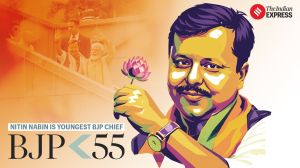Sonia got it right this time
Well done, Sonia Gandhi. Not words you would expect to read in this column and not words I expected ever to write.

Well done, Sonia Gandhi. Not words you would expect to read in this column and not words I expected ever to write. I have never hesitated to admit that the idea of an Italian prime minister of India was for me a matter of deep embarrassment and I opposed it from the moment Sonia took her first, faltering steps in Indian politics. Then she wisely refused to accept the job, choosing instead to become the eminence grise of her hand-picked prime minister8217;s government, and my objections to her presence in Indian politics weakened. She did win an election and who can argue with the box office.
My next problem with Mrs. G was that I found myself in conflict with her grandiose schemes to remove poverty. They were in my view no different to similar schemes that had failed in the past. Her most significant contribution to this government has been the employment guarantee scheme, which, at huge expense, will serve mostly to keep millions of poor people in poverty indefinitely. I have met families who live on a hundred days of work a year and they live in poverty so dire it hurts to describe it. If the scheme taught them a skill it would empower them. In its present form it works as charity.
Having said this, let me say that last week when I heard Sonia Gandhi telling her Marxist ex-best friends that they were enemies of progress, I was impressed. I caught the speech on television and watched with growing admiration as she ticked Commissar Karat and his comrades off in clear, unambiguous words. Those who oppose the nuclear deal, she said, are not just enemies of the Congress, but enemies of development, because there can be no development without energy. India needs energy if there is to be development.
Before some idiots in her party advised her to tone down her attack, lefties of varying hues, from boring A.B. Bardhan to scintillating Subhashini Ali, went on nationwide television to take her on. I thought they looked defensive, unsure and nervous. I think they know that they have blown it. Never before have I seen Hindi newspapers openly charge them with being stooges of China. Politicians of leftist persuasions believe that the vernacular press more accurately reflects public opinion than the 8216;elite English press8217;, so they need to start worrying about the next election. As Sonia Gandhi said in her address to the farmers of Jhajjar, it was time to give these 8216;vikas key dushman8217; a kick in the teeth. Brava Sonia!
It8217;s not just because I dislike communists that I liked Sonia8217;s speech. I liked it because she is the first politician to take, however obliquely, the idea of economic reform to a grassroots gathering. Usually, we get to hear eloquent speeches advocating economic reform in the glittering halls of five star hotels in Delhi and Mumbai, but unleash these same politicians onto a rural audience and they revert to the standard spiel about socialism. One of the reasons why the average Indian is not a supporter of economic reform is because almost no political leader has attempted to explain what it means nor why we are doomed without it.
Now that Sonia Gandhi has talked about the link between energy and development, can we hope that others will follow her lead? If the next election is about economic reforms, then the sooner it happens the better. We need politicians to explain to ordinary voters that India would be the richest country in the world if we followed the right economic policies. We need politicians who tell the people that we moved away from socialism 15 years ago because socialist economic policies had brought us to the verge of bankruptcy. We need politicians who tell the people that the license-quota-permit raj had to end because entrepreneurs needed to be freed from the clutches of officials who were mostly corrupt.
We need politicians who admit publicly that the reason why there are not enough schools and colleges in India is because licenses and quotas continue to operate in this area and officials are afraid to let go of their powers and controls. We need politicians who admit that the reason why India does not have sufficient supplies of electricity, clean water and housing is because our policies were wrong. We need them to admit that if labour reform happens there will be thousands and thousands more jobs because commercial enterprises will no longer be afraid of employing someone they cannot sack.
Will these become issues in the next election? It8217;s hard to say. What can be said with certainty is that the political party that succeeds best in explaining that bijli, sadak, pani are what economic reform is about will win.
- 01
- 02
- 03
- 04
- 05









![Kokrajhar [Assam], Jan 20 (ANI): Police deployed during a protest between two groups at National Highway, in Kokrajhar on Tuesday. (ANI Video Grab)](https://images.indianexpress.com/2026/01/kokrajhar.jpg?w=300)





















